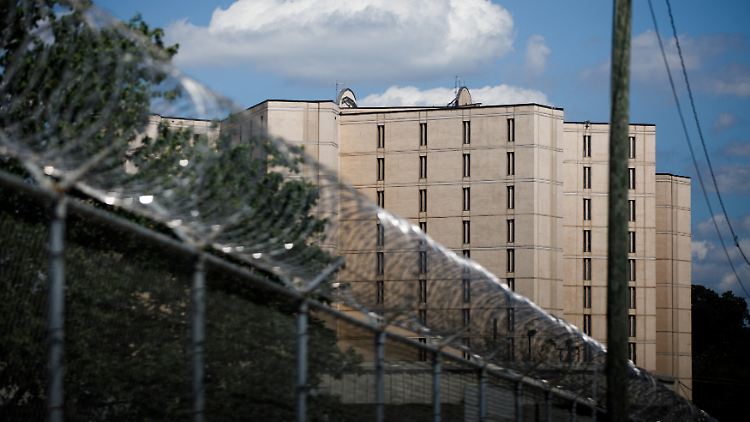Trump wants to become US President again and thereby also get rid of legal problems. But the charges in the state of Georgia are tough. If he were convicted, he could only be pardoned many years later – and only if he denied himself.
There are 13 counts on which Donald Trump is indicted in the US state of Georgia. As the head of a criminal conspiracy, including for extortion, incitement to break the oath of office, and forgery. With the ex-president, 18 people involved have to answer. Among them are his attorneys, Rudy Giuliani and John Eastman, and his former White House chief of staff, Mark Meadows.
Georgia prosecutors would ideally like to start the trial on March 4 in Atlanta, in the middle of the 2024 presidential primary. Trump’s attorneys will present their own timeline and most likely delay the start for as long as possible. For good reason: the allegations against him and others weigh heavily. The hurdles to avoiding imprisonment after a conviction are very high in Georgia.
Trump wanted to “find votes” in the state to stay in the White House for four more years. He had lost Georgia extremely narrowly, it was one of the decisive factors for his overall defeat. According to research by the Washington Post, the threads of Trump’s efforts and those of his team to turn the 2020 election result into a victory also ran through the Coffee County constituency in southeast Georgia.
Four people from Coffee County have now been charged with data theft and conspiracy. Among them is the constituency’s chief returning officer and the local Republican party leader. Coffee County could now become Trump’s undoing with regard to 2024. The polling station case shows how Republicans down to the constituency level attempted to support Trump’s claims, even when doing so illegally; how many of them wanted to help somehow prevent the end of the Republican government in the face of the election defeat by Democrat Joe Biden.
Legal and political storm on the horizon
According to the indictment, 30 unnamed people were involved in the illegal operations. Seven of them are said to have directly helped steal data from Coffee County voting machines and another to coordinate and communicate with Giuliani. The “Washington Post” has now identified her by name and her actions sketched. Accordingly, Trump’s team tried or managed to steal the data from voting machines in other contested states in addition to Georgia. “The uncharged, unnamed co-conspirators could be key witnesses,” the authors write.
Trump has been charged in four separate cases so far. In addition to what is happening at the state level in Georgia, there is the hush money case of porn actress Stormy Daniels in a New York state court. Add to that the indictments of the federal prosecutor’s office in the Department of Justice for the secret documents in Mar-a-Lago and the riot of January 6, 2021.
In this prison in Georgia, Donald Trump and his cronies have to appear for the reading of the charges against them.
(Photo: Dustin Chambers)
All of the main negotiations could take place during the coming election year, unleashing a legal and political storm. Should Trump move back into the White House, he could order the Justice Department to drop Special Counsel Jack Smith’s two charges against him. He could also try to pardon himself, as a precautionary measure and regardless of what the courts decide afterwards.
In the Watergate scandal, then-President Richard Nixon refrained from taking the chance. In a previous analysis, the Justice Department had ruled that the President could not pardon himself because of “the fundamental principle that no one should be the judge in his own case.” If someone else is elected president, they could pardon them. Several Republican candidates have indicated they would.
In Georgia, however, the case is different anyway: At the state level, the president has no power of disposal, and the governor there is also not allowed to grant a pardon. This is decided by a five-person committee. However, she may do so at the earliest five years after the verdict. Trump has no influence on the composition of the commission. A commissioner serves a seven-year term, after which the governor proposes a replacement to the Georgia Senate.
Georgia makes the rules
According to the Georgia Justice Project, an aid organization for convicts, there are hardly any exceptions to the five-year limit. But even if one were made because of extraordinary circumstances – Trump has to go to prison but is elected president – Trump would have to admit his crime and show remorse for a pardon. The ex-president who never admits mistakes and always attacks that he would have to bow to state rules one way or the other.
So far, Trump has behaved in exactly the opposite way. He repeatedly declares himself innocent and verbally lashes out. Most recently, he even announced a press conference for Monday, August 21, at which he wanted to expose alleged election fraud in Georgia with an “irrefutable report” in order to exonerate himself. According to media reports, his lawyers do not think this is a good idea. They therefore fear disadvantages in the court proceedings. The situation is already complicated enough for her client.
